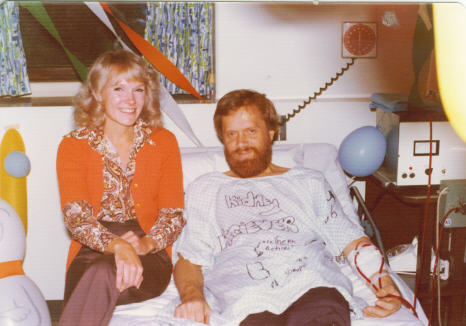Siblings bonded by a kidney, sense of humor, and organ donation message
On Wednesday, April 11 at 11:05am Hennepin Healthcare will celebrate the thousands of lives changed thanks to its 55th year of kidney transplant at a flag-raising ceremony outside HCMC’s 717 South 6th St. entrance. Every year Hennepin Healthcare honors donors and their families who have given organs, tissue, eyes and blood at this flag-raising ceremony to mark National Donate Life Month.
Attending this year’s Donate Life celebration will be special guests John Nelson, who received a kidney from his sister, Kris Roberts on October 23, 1975 – 42 years ago! Nelson and Roberts will be driving all the way from South Dakota for the flag-raising ceremony.
“So much has happened in the past 42 years that would not have been possible without my sister’s generous donation,” explains Nelson, a 75-year-old who retired from a successful career in the South Dakota Health Department.

Kris and John in 1975 at dialysis
“I was on dialysis in 1974 and at that time the life expectancy for someone with my diagnosis was 5 years. But after transplant surgery, I went on to complete a 35-year career in public heath microbiology. My wife and I have been married for 53 years. Thirty-nine years ago we adopted our daughter, and we now also have a grandson.”
“In my mind, there was no decision to be made,” said Kris Roberts when asked about her decision to donate her kidney to her brother. “As soon as I heard that he needed a kidney, I wanted to help. It was a great honor to improve his life.”
She recalls celebrating the first-year anniversary of the transplant. “I had ordered a balloon bouquet for John to be sent to him at work. I was working at Sears at the time, when a man with a large balloon bouquet arrived looking for me. I said, ‘no – that’s supposed to be delivered to my brother at the Public Health Department – not me!’ I was so disgusted. But he looked at the delivery ticket and said, ‘no, these are for you.’ Here my brother had sent me a balloon bouquet, too.”
Nelson and his sister are traveling from South Dakota to share their story and encourage others to make the decision to become an organ donor. “The kidney transplant changed my life, and I’m so grateful,” said Nelson.
“He’s taken such great care of that kidney,” said Roberts, a Los Angeles Rams fan who like any good sister occasionally enjoys poking a little fun at her brother. “My brother is a huge Vikings fan, so for Christmas one year I bought him a Vikings sweatshirt, but had a bit of embroidery added: ‘My heart belongs to the Vikings, but my kidney is a Ram’s fan.’”
But in all seriousness, she is so grateful that the siblings were such a close match and that the transplant was such a success. “You very rarely get that kind of opportunity in your lifetime to help someone you love in in this way.”
The Hennepin Healthcare Transplant Program is a collaborative effort among professionals who specialize in the pre-transplant, operative, and long-term follow-up care of end-stage renal disease patients, in partnership with their primary physician or nephrologist.
Hennepin Healthcare Donation Facts:
- Hennepin Healthcare has a long history of supporting the Gift of Life by performing the first kidney transplant in the Upper Midwest on February 13, 1963.
- We celebrate our Kidney Transplant Program’s 55th anniversary this year with 2923 kidney transplants to date.
- In 2017 alone, 11 generous living donors provided the Gift of Life with the donation of a kidney through the HCMC Transplant Program.
- With our partners at LifeSource, we were able to coordinate 22 organ donations from deceased donors, impacting 67 people suffering with organ failure. In addition, 33 individuals were able to donate tissue, which helped 1650 people.
- With our partnership with Memorial Blood Centers, HCMC blood drives collected 168 pints of blood.
- With our partnership with Lions Gift of Sight, and the selfless donation from 101 donors, we were able to procure 60 corneas for transplantation and 89 eyes were donated to further advance research for diseases such as diabetic retinopathy and macular degeneration.

